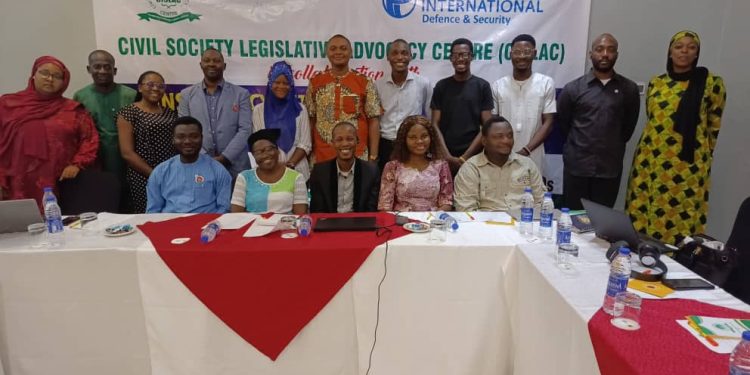The Civil Society Legislative Advocacy Centre (CISLAC) has charged Civil Society Organizations (CSOs) in Nigeria to improve their oversight functions in the Defence and Security Sector for more efficiency and transparency.
The group made the call during a two-day capacity building for CSOs organized with support from Transparency International – Defense and Security Programme.
In his welcome remarks, Auwal Ibrahim Musa, the Executive Director of CISLAC, explained that the need for independent oversight and immediate reform in the Defence and Security sector cannot be over-emphasized, particularly concerning financial transparency, gender inclusion as well as operational disparities as these have significantly impacted the overall integrity and efficiency of the sector.
Stressing the importance of oversight, Ibrahim Musa explained that the “major drivers of corruption in the Defence and Security sector include shady procurement process; excessive secrecy in procurement process and spending; inter-agency rivalry; inflated procurement and phantom Contracts; and delayed appropriation process.”
He thereafter charged CSOs not to relent in their roles of perfoming oversight functions on the Defence and Security sector in the country.
In his presentation, Dr. Sunday Adejoh, a lecturer at the Department of Defence and Security Studies, Nigeria Defense Academy (NDA), Kaduna, noted that “limitations of civilians oversight of the sector include issues of corruption by oversight agencies, weak democratic practices within the institutions and lack of capacity and technical competences by some oversight bodies.”
Adejoh also mentioned that the Nigerian security sector, as currently constituted, is excessively controlled by the Executive arm of government and this weakens legislative oversight of the sector.
He thereafter recommended that “there should be increased capacity building for security sector oversight bodies such as the National Assembly.
“There is the need to continue to promote civil-military relations and best democratic practices.”
Prof Sharkdam Wapmuk from the Department of Defense and Security Studies, NDA, Kaduna explained that corruption in the Defence and Security sector has far-reaching implications for national security because it weakens the capability of the armed forces.
Wapmuk said lack of oversight also “diminishes the effectiveness of law enforcement and creates vulnerabilities that can be exploited by both internal and external threats.”
Earlier, Maryam Madi Abubakar, Programme Officer at CISLAC noted that “the project aims at strengthening the capacity of relevant oversight stakeholders to advocate and conduct state and national engagements towards an accountable, responsive, and efficient management of Nigeria’s Defence and Security sector.”
The communique was drafted by Jimoh Abubakar, Communications Officer at CISLAC, and adopted by all participants, with key recommendations on how to enhance the oversight roles of CSOs.

